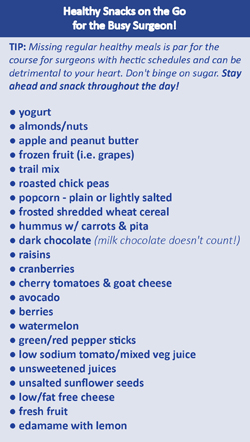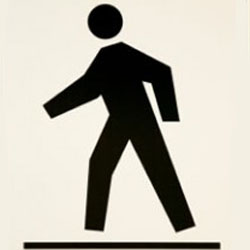HEALTHY SURGEON
Physician Burnout
- Signs of Stress
- Did You Know...
- Helpful Tips & Tricks
- Articles, Videos, Apps
- Helpful Resources/ Contacts
SIGNS OF STRESS & TRIGGERS
"...the World Health Organization International Classification of Diseases defines burnout as a 'state of vital exhaustion.' The Maslach Burnout Inventory, which is considered the gold standard in research studies for estimating burnout prevalence among physicians, captures three dimensions of burnout: emotional exhaustion from overwhelming work demands, depersonalization (e.g., impersonal response toward patients or coworkers) and a perceived lack of personal accomplishment. Symptoms of burnout can be physical (e.g., insomnia, fatigue, headaches, gastrointestinal upset) and psychological (e.g., irritability, cynicism, decreased concentration)." - CMAJ, Fralick & Flegel, June, 2014.
Physical Symptoms
- Anxiety/ Panic attacks / Shortness of breath
- Chest pain/palpitations
- Headaches
- Muscle aches - back, head, stiff jaw...
- Fatigue/lethargy
- Gastrointestinal distress
- Sleep disorders
- Weight gain/loss
Emotional Symptoms
- Loss of humour
- Irritability/resentment/bitterness
- Depressed mood/apathy
- Feelings of failure/guilt/blame
- Disinterested in the things that usually bring you joy (i.e. music, hobbies, etc.)
Cognitive Symptoms
- Poor concentration
- Rigidity/resistance to change
- Suspicion/mistrust
- Stereotyping
- Objectification/distancing
- Ruminations (of leaving, revenge, and so on)
Behavioural Symptoms
- Work avoidance (absenteeism, clock-watching)
- Diminished personal conduct with patients/colleagues
- Inflexible behaviour
- Habitual lateness
- Addiction (alcohol, drugs, affairs, shopping)
- Attempted suicide
Triggers
- Pressure to see high volume of patients
- Piles of paperwork
- Complicated and confusing rules and guidelines
- Dr. Oz and the like
- Media's coverage of the latest research/studies
- Drug seekers and inability to say no to patients
- Politics and medicine (hospital administrators, gov't contract, OHIP billing)
- Constant weight of responsibility
- Difficult procedures
- Difficult patients
- Loss of a patient
- Blood Borne Pathogen (BBP) exposure
- Medicolegal matters
- Worry of potential jeopardy to reputation due to one bad case
- Family pressures
- Hospital Administrative pressures
- Colleague pressures/conflicts
Sources: Support4Doctors, Physician's Weekly, OMA
Did You Know...
- In 2003, 45.7% of Canadian physicians were found to be in advanced stages of burnout
- this is higher than previous studies of burnout within other occupational groups in Canada (38% to 42%)
- Slightly more female physicians (47.6%) than male (44.6%) are in advanced stages of burnout.
- Physicians under 35 or 55 years or older are less likely to suffer from advanced burnout than their colleagues in the 35-54 age group.
Source: Based on "CMA Study on Physician Burnout", 2003
Helpful Tips & Tricks

|
 |
You advise your patients to follow these common sense tips, but do you follow your own advice?
- When was your last check up? ...Get an annual physical and check your blood pressure, cholesterol, etc.
- Pay attention to changes in your physical health
- Stop caffeine
- Learn to Relax - at least once a day, sit quietly for 5-10 minutes during a break or between patients. Watch a YouTube video!
- Take relaxing breaths - breath in to a count of 5 and breath out slowly
- Catch up on your sleep... or find a night routine that works for you if you're having difficulty falling/staying asleep
- Learn to Meditate
- Try a Yoga class
- Mindfulness - Google it!
- Repetitive prayer
- Do some regular exercise - something as simple as walking 20-30 minutes each day from your car to your office or else during your lunch hour to get away from the office (i.e. park your car at the back of the lot)
- Don't miss breakfast...and try to sit and relax to enjoy it if possible
- Aim to eat 3 meals a day - this way there is more of an opportunity to eat something nutritious
- Take time for a healthy snack - nothing fancy, just 2 items (i.e. apple and peanut butter)
- Add more healthy foods to your diet - eat more complex carbs, while cutting down on sugar and other simple carbs; consider eating a more Mediterranean type of diet with more fish and fewer saturated fats; try a fruit or veggie smoothie - it's dense with nutrition, portable and fast .
- Avoid excessive alcohol intake/drugs
- Group sports - it's not only active but social!
- Use self-restraint and try not to overextend yourself.
- Schedule “down time”
- Read a nonmedical journal
- Don't dwell on what you cannot control, and solve the little problems. This helps gain a feeling of control.
- Delegate least important tasks to your staff
- Set realistic goals - what's really important to you
- Reduce long hours, and take a vacation out of town
- Ask for help -talk with a trusted friend, colleague, family member, health care professional or a counsellor
- Avoid overscheduling and don't be afraid to say "No"
- Learn to deal with difficult people (i.e. patients, colleagues, etc.)
- Breathing Methods (Harvard)- First steps. Find a quiet, comfortable place to sit or lie down. First, take a normal breath. Then try a deep breath: Breathe in slowly through your nose, allowing your chest and lower belly to rise as you fill your lungs. Let your abdomen expand fully. Now breathe out slowly through your mouth (or your nose, if that feels more natural). Breath focus in practice. Once you've taken the steps above, you can move on to regular practice of controlled breathing. As you sit comfortably with your eyes closed, blend deep breathing with helpful imagery and perhaps a focus word or phrase that helps you relax.
- Breathing Methods (CMA) - CAF uses tactical breathing to focus, gain control and manage stress. This strategy also helps control worry and nervousness. Here’s how to do it: 1) Visualizing each number as you count, breathe in slowly for a count of four. 2)Pause and hold your breath for a count of four. 3)Exhale slowly for a count of four. 4) Repeat three to five times.
- Spend time with your family!
- Spend time with your friends!
- Spend time with your dog! ...better yet, take him/her for a walk!
Sources: Support4Doctors, OMA, CMA, Harvard Health
2017
Mindfulness Apps:
Headspace
Calm
The Mindfulness App
Insight Timer
Smiling Mind
Stop, Breathe & Think
Jan,2015: Avoiding Burnout
SAGES2014 Video - Presented by Jo Buyske, MD
Jan,2015: Balancing Career/Personal
SAGES2014 Video - Presented by Kevin Reavis, MD
Dec,2014: Sleep Deprivation & Physicians
CBC article
Resources
If you're a General Surgeon struggling with mental wellness who needs help now, the Ontario Medical Association has a program in place to assist:
OMA Toll Free: 1-800-851-6606 (M-F; 8:45am-5pm)
OTHER AFTER HOURS EMERGENCY/CRISIS PREVENTION:
Ontario Distress Centres: 416-486-2242
Centre for Suicide Prevention (based out of Calgary but serves across Canada): 403-266-HELP (4357)
211 Ontario Community & Social Services (or dial 211 from your phone and someone will help you directly or else refer you to the appropriate options within your community)
MOHLTC
- ConnexOntario Health Services Information - www.connexontario.ca
- Drug and Alcohol Helpline: 1-800-565-8603; http://www.drugandalcoholhelpline.ca/
- Ontario Problem Gambling Hotline: 1-888-230-3505; http://www.problemgamblinghelpline.ca
- Mental Health Helpline: 1-866-531-2600; http://www.mentalhealthhelpline.ca/
OMA
OMA Physician Health Program - http://php.oma.org/; 1-800-851-6606 (confidential toll free)
OMA Physician Health: Burnout & Stress - download video
OMA Physician Strategies for Coping with Stress - download
OMA Tips & Advice for Physicians Helping Colleagues Experiencing Burnout (M.Goldstein)- download audio
OMA Physician Health Program: Mental Health & Burnout Discussion
(J.Albuquerque) - download audio
CMPA
Coping with the stress of medical practice
CMA
CMA Physician Health and Wellness
OTHER COMMUNITY RESOURCES
211 Ontario Community & Social Services (or dial 211 from your phone)
Canadian Association for Suicide Prevention (CASP)
CASP blog